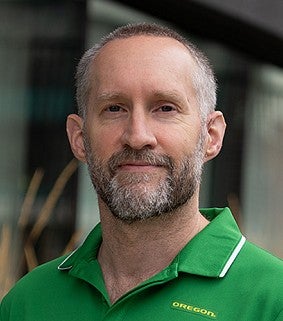
Human Physiology
halliwil@uoregon.edu | 541-600-4337
Course: HPHY 470 Environmental Physiology
In my courses you will:
- Make connections to lived experiences and real-world challenges.
- Learn with and from peers.
I was invited into the Teaching Academy because:
- I am a Williams Fellow.
In what ways are you working to make your teaching inclusive?
On day one, I share with students my goal of giving them a sense of belonging, making sure they feel represented and have a voice in the class. Throughout the term, I enforce these goals through my actions. Belonging: learning names, using inclusive language, holding office hours in convenient student-friendly locations, encouraging working with other people, acknowledging academic diversity (career goals, academic abilities), and acknowledging non-binary sex and gender. Representation: my lecture slides include images and examples of underrepresented communities, and my lectures include points that highlight historic instances of bias in science and gender bias in recently published articles. Voice: I request input on class logistics, engage students in discussions, use random call, correspond respectfully and timely, provide opportunities for non-verbal communication, and request midterm and end-of-the term feedback.
What do you do in terms of professional engagement with the teaching and learning culture on campus or nationally?
I am a life-long learner and try to read one book on educational leadership or effective teaching each year. Locally, I have served on my departments various curriculum committees and have been a speaker at our annual Teaching Academy for most of its existence. On the national level, I have given several seminars on engaging undergraduates in physiology research and on the future of undergraduate majors in human physiology. I was a founder of the Physiology Majors Interest Group, a national organization that facilitates discussions of best practices across programs that serve undergraduate physiology students.
In what ways was your teaching in this course research-led—informed by research on how students learn and inflected by UO's research mission?
The very nature of this course is linked to my research within the field of environmental physiology, in which we study the human response to extremes of heat, cold, altitude, and diving. In this class, we interweave the science of human performance under stress with evidence-based approaches to teaching, such that students are engaged in a term-long project involving peer learning to explore and explain human survival and adventure in the real world. Through the lens of environmental physiology, we connect cutting-edge science to the real world: life and death in the outdoors.
What led me to this discipline?
I’ve always been fascinated by stories of human adventures in extreme environments. Reading the classic mountaineering narratives in high school is what first developed my interest in environmental physiology. Experiences as a nordic ski patroller teaching winter first aid topics such as hypothermia and frostbite along with a summer doing spaceflight-related research at Kennedy Space Center further nurtured my interest in the field.
